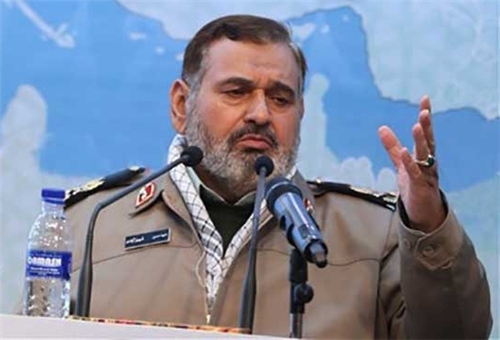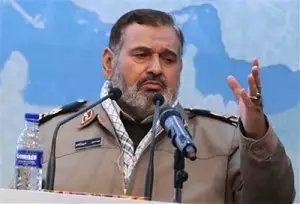Iranian Top Commander: Deception Logic of US Secretary of State

 Chief of Staff of the Iranian Armed Forces General Hassan Firouzabadi said the US secretary of state is pursuing a logic of deception, and asked the US statesmen to return to the logic of freedom and human equality and move in the framework of international laws and regulations.
Chief of Staff of the Iranian Armed Forces General Hassan Firouzabadi said the US secretary of state is pursuing a logic of deception, and asked the US statesmen to return to the logic of freedom and human equality and move in the framework of international laws and regulations.
Major General Firouzabadi, by criticizing remarks of a number of US officials and their viewpoints on the US interests said the logic of John Kerry, US Secretary of State, is a logic of deception, because he says that the US will do whatever is necessary for the US interests.
He asked the US statesmen whether the US citizens were your slaves that you spied on them in different ways. Are people of France and Germany your slaves that you were spying on their officials?
The Iranian top commander once again asked the US officials whether the military expeditions into Afghanistan and Iraq and death of tens of thousands of innocent people provided your interests. Was 60 years of espionage and bullying against Iranians logical?
He further stressed that events in Syria indicated that the US calculations are not correct and they may make big mistakes, too.
On Saturday, Secretary of Iran’s Expediency Council (EC) Mohsen Rezayee stressed Iran’s willingness to interact with the world nations based on mutual respect, and urged the US delegation’s representative in multilateral nuclear talks with Iran to be aware of her remarks when speaking about the Iranian nation.
Rezayee stressed that Tehran favors a foreign policy doctrine which is based on mutual respect.
He noted that the US representative to the nuclear talks between Iran and the world powers should be aware that she must not to talk to the Iranian nation in the old fashion they used to do.
Earlier this month, Wendy Sherman, the State Department’s third-ranking official, who headed the US delegation in Geneva nuclear talks, told the Senate Foreign Relations Committee that officials were looking for ways Iran could “build confidence” and provide time for diplomacy to work. “We know that deception is part of the DNA” in Iran, she claimed.
Last Tuesday, members of the Iranian Parliament’s National Security and Foreign Policy Commission lashed out at Sherman for her insulting remarks against the Iranian people.
Also in last Tuesday, Iranian Foreign Ministry Spokeswoman Marziyeh Afkham said in her weekly press conference in Tehran, “If Ms. Sherman’s political statements and expressions resemble what has been quoted from her, then doubt should be cast over her other remarks (which she has made during the negotiations between Iran and the world powers in Geneva)”.
Iran and the six world powers agreed in their third session of talks on October 15 to follow up on the nuclear negotiations on November 7 and 8.
At the end of the negotiations, EU Foreign Policy Chief Catherine Ashton hailed the nuclear negotiations as the “most detailed” and most “substantive” ones ever held between the two sides.
Washington and its western allies accuse Iran of trying to develop nuclear weapons under the cover of a civilian nuclear program, while they have never presented any corroborative evidence to substantiate their allegations. Iran denies the charges and insists that its nuclear program is for peaceful purposes only.
Tehran stresses that the country has always pursued a civilian path to provide power to the growing number of Iranian population, whose fossil fuel would eventually run dry.
Despite the rules enshrined in the Non-Proliferation Treaty (NPT) entitling every member state, including Iran, to the right of uranium enrichment, Tehran is now under four rounds of UN Security Council sanctions and the western embargos for turning down West’s calls to give up its right of uranium enrichment.
Tehran has dismissed West’s demands as politically tainted and illogical, stressing that sanctions and pressures merely consolidate Iranians’ national resolve to continue the path.
Tehran has repeatedly said that it considers its nuclear case closed as it has come clean of the International Atomic Energy Agency (IAEA)’s questions and suspicions about its past nuclear activities.







